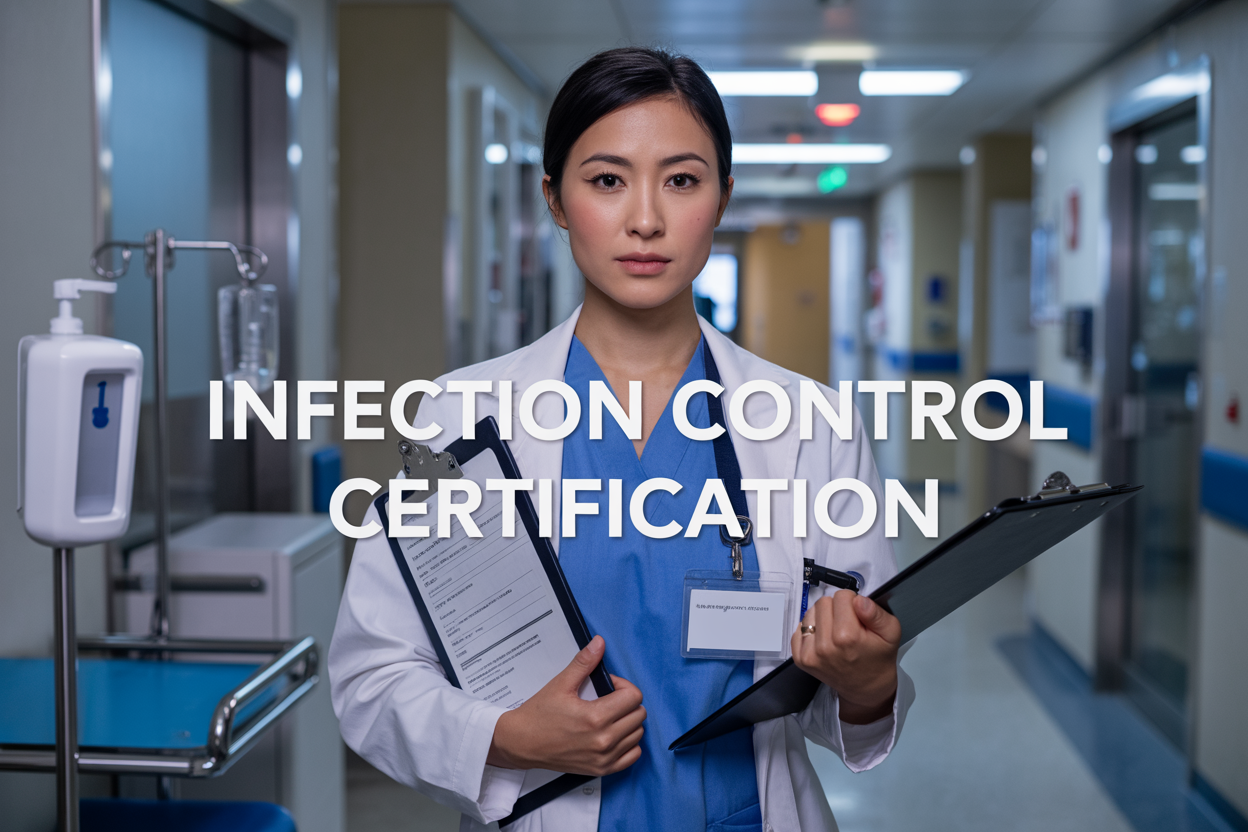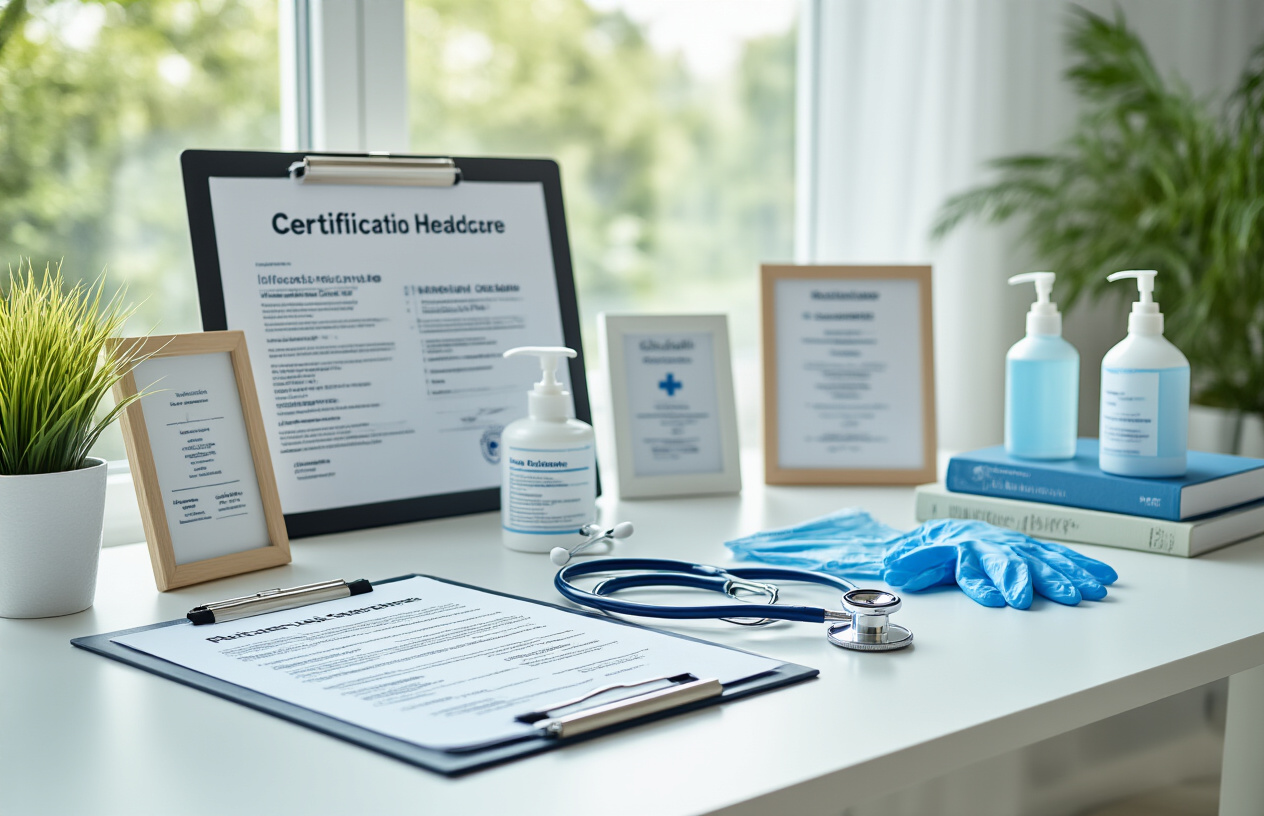
Hospital infections affect millions of patients every year, making infection control nurses the frontline defenders of patient safety. These specialized healthcare professionals work to prevent, detect, and manage infectious diseases within medical facilities.
This guide is designed for registered nurses considering infection control certification, healthcare administrators looking to strengthen their infection prevention programs, and nursing students exploring specialized career paths.
You’ll discover the essential requirements and certification options available for infection control nursing, plus learn about the career advancement opportunities and competitive salary benefits that come with this critical healthcare specialization. We’ll also cover how to evaluate whether investing in infection control nurse certification aligns with your professional goals and financial situation.
Understanding the Critical Role of Infection Control Nurses

Protecting Patients from Healthcare-Associated Infections
Infection control nurses stand as the frontline defense against healthcare-associated infections (HAIs), which affect millions of patients annually. These specialized professionals implement evidence-based protocols, monitor infection trends, and educate healthcare teams on proper hygiene practices. Their vigilant oversight directly prevents life-threatening complications like surgical site infections, catheter-related bloodstream infections, and ventilator-associated pneumonia. Through systematic surveillance and rapid response protocols, infection control nurses identify potential outbreaks before they spread, protecting vulnerable patient populations including immunocompromised individuals, surgical patients, and those in intensive care units.
Reducing Hospital Mortality Rates Through Prevention
The impact of infection control nurses on patient mortality cannot be overstated. Healthcare-associated infections contribute to approximately 99,000 deaths annually in the United States, making prevention efforts critical for saving lives. Infection control nurses analyze mortality data, identify patterns linked to infectious complications, and develop targeted interventions that significantly reduce death rates. Their work includes implementing hand hygiene campaigns, establishing isolation protocols for contagious patients, and ensuring proper sterilization of medical equipment. Hospitals with dedicated infection control programs report mortality reductions of up to 30% for certain high-risk procedures, demonstrating the life-saving value these nurses bring to healthcare settings.
Saving Healthcare Costs by Stopping Infection Outbreaks
Healthcare-associated infections cost the U.S. healthcare system billions of dollars annually, with individual infection cases adding thousands to patient bills. Infection control nurses deliver substantial financial benefits by preventing costly complications that extend hospital stays and require expensive treatments. A single prevented central line infection saves hospitals approximately $46,000, while avoiding one surgical site infection reduces costs by $25,000 or more. These nurses conduct cost-benefit analyses, track infection-related expenses, and demonstrate return on investment for prevention programs. Their proactive approach to infection prevention generates savings that far exceed program costs, making infection control nursing both a clinical and financial imperative for healthcare organizations.
Ensuring Compliance with Federal Safety Standards
Infection control nurses ensure hospitals meet stringent federal regulations from agencies like the Centers for Disease Control and Prevention (CDC) and the Centers for Medicare & Medicaid Services (CMS). They maintain detailed documentation of infection rates, implement required reporting protocols, and prepare facilities for regulatory inspections. These professionals stay current with evolving guidelines, such as updated isolation precautions and antimicrobial stewardship requirements. Non-compliance can result in hefty penalties, loss of accreditation, and reduced reimbursement rates. Infection control nurses protect their organizations from these consequences while maintaining the highest standards of patient safety through comprehensive compliance programs and continuous quality improvement initiatives.
Infection Control Nurse Certification: by Global A1 Institute of Paramedical Science
In today’s healthcare environment, infection control nurses play a crucial role in ensuring patient safety and maintaining hospital hygiene standards. If you’re a nurse looking to advance your career and make a real impact, the Infection Control Nurse (ICN) Certification from Global A1 Institute of Paramedical Science is the perfect choice.
This online recorded course is designed for working nurses who want to upskill at their own pace while gaining in-depth knowledge of infection prevention, hospital protocols, sterilization techniques, and outbreak management.
Why Choose Global A1 Institute of Paramedical Science?
✅ Learn from experienced doctors and infection control experts
✅ Fully online, recorded lectures with lifetime access
✅ Active doubt-solving community for ongoing support
✅ Affordable course fee with easy monthly EMI options
✅ ISO-certified and recognized certification
Join thousands of nurses who are already strengthening hospital safety standards across India.
👉 Enroll today and become a certified Infection Control Nurse with Global A1 Institute of Paramedical Science!
Essential Requirements for Infection Control Certification

Educational Prerequisites and Nursing Experience
Most infection control certification programs require candidates to hold an active RN license with at least two years of clinical nursing experience. Many employers prefer bachelor’s degree preparation, though associate degree nurses with strong clinical backgrounds remain competitive. Experience in acute care settings, particularly medical-surgical units, intensive care, or emergency departments, provides valuable exposure to infection risks and prevention protocols that form the foundation for specialized practice.
Specialized Training in Epidemiology and Microbiology
Certification candidates must complete focused coursework covering epidemiological principles, microorganism behavior, and disease transmission patterns. Training programs emphasize statistical analysis methods for outbreak investigation, antimicrobial resistance mechanisms, and environmental safety protocols. Many programs offer online modules combined with hands-on laboratory sessions to reinforce theoretical knowledge. Continuing education units in these core areas help maintain certification status and keep practitioners current with evolving pathogens and prevention strategies.
Clinical Hours in Infection Prevention Settings
Practical experience requirements typically include 150-200 supervised clinical hours in infection prevention departments or similar healthcare settings. These rotations expose candidates to real-world surveillance activities, policy development processes, and interdisciplinary collaboration with laboratory staff, physicians, and environmental services teams. Clinical preceptors guide trainees through outbreak investigations, compliance auditing, and staff education initiatives. Documentation of these experiences becomes part of the certification application portfolio, demonstrating readiness for independent infection control practice.
Certification Program Options and Career Pathways

Certification in Infection Control (CIC) Credentials
The CIC certification stands as the gold standard for infection prevention professionals. Offered by the Certification Board of Infection Control and Epidemiology (CBIC), this rigorous program tests knowledge across surveillance, prevention, and outbreak management. Candidates need two years of infection control experience and must pass a comprehensive exam covering everything from microbiology to environmental safety protocols.
Healthcare Infection Control Practices Certificate Programs
Short-term certificate programs provide focused training for healthcare workers entering infection control. Universities and professional organizations offer these intensive courses covering hand hygiene protocols, isolation procedures, and sterilization techniques. These programs typically span 3-6 months and serve as stepping stones toward full certification or specialized roles in infection prevention departments.
Advanced Degree Specializations in Infection Prevention
Master’s programs in epidemiology, public health, or nursing now feature infection control concentrations. These degrees combine research methodology with practical infection prevention strategies. Students explore antimicrobial resistance, healthcare-associated infection surveillance, and policy development. Many programs offer hybrid formats allowing working professionals to advance their education while maintaining clinical responsibilities.
Continuing Education Requirements for Maintenance
CIC certification requires 60 continuing education points every five years to maintain active status. Approved activities include conferences, webinars, peer-reviewed publications, and teaching opportunities. Professional organizations like APIC provide extensive educational resources, while many employers support attendance at national conferences. Regular participation in infection control committees and quality improvement initiatives also counts toward renewal requirements.
Making the Investment in Your Infection Control Career

Choosing the Right Certification Program
Research accredited programs thoroughly, comparing curriculum depth, clinical requirements, and faculty expertise. Look for programs offering flexible scheduling options, online components, and hands-on simulation experiences. Consider programs with strong industry partnerships and high pass rates for certification exams.
Balancing Work Responsibilities During Training
Many infection control programs accommodate working nurses through evening classes, weekend intensives, and hybrid learning formats. Communicate early with supervisors about your educational goals and potential schedule adjustments. Create a realistic study schedule that aligns with your shift patterns and family commitments. Some employers offer modified work schedules or temporary reassignments to support your training.
Leveraging Employer Support and Tuition Assistance
Most healthcare facilities offer tuition reimbursement programs for employees pursuing infection control certification. Submit applications early as funding is often limited and competitive. Negotiate continuing education leave or professional development time as part of your employment benefits. Some organizations provide mentorship programs pairing students with experienced infection control professionals. Document how your certification will benefit your current role and the organization’s infection prevention goals when requesting support.
Infection control nurses stand at the frontline of patient safety, wielding specialized knowledge and certifications that make hospitals safer for everyone. Getting certified opens doors to better pay, leadership roles, and the chance to directly impact infection rates in healthcare settings. The certification requirements might seem demanding, but the various program options make it achievable for nurses at different career stages.
Taking the step toward infection control certification means investing in both your professional growth and patient outcomes. Healthcare facilities desperately need skilled infection control specialists, and the salary bumps that come with certification reflect this high demand. If you’re passionate about prevention and want to take on a role where you can see measurable results in patient safety, infection control nursing offers a rewarding career path that’s only growing more important in today’s healthcare landscape.
Author
-

Dr. Sunil Saini is a distinguished orthopedic surgeon with expertise in cosmetic limb lengthening, deformity correction, and Ilizarov surgery. With a career spanning over two decades, he has made significant contributions to the field of orthopedics, particularly in advanced limb lengthening techniques.
View all posts

